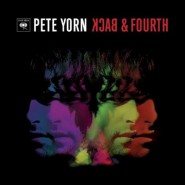 Pete Yorn
Pete YornBack & Fourth
Score: 58
Pete Yorn began releasing albums in 2001 with his first LP, musicforthemorningafter, though he began creating music far before that. His newest album, Back & Fourth, follows a trilogy of loosely connected albums that included his first. Yorn has always been associated with alt and acoustic rock and the singer-songwriter aesthetic, and his newest album displays influence from all of these sources. Unfortunately, it lacks the inspiration needed to make it into an especially interesting release.
Pete Yorn has managed to work in some strong points into his otherwise dull album. “Social Development Dance” begins with a simple guitar line accompanying Yorn’s vocals, but nearing the first minute, a second guitar enters with a percussion line, and while the percussion isn’t notably unique, the guitar adds a somewhat creative countermelody. The combination, though not terribly unexpected, trumps any action taken earlier in the album. In the adjacent track, “Shotgun,” the guitar, which had previously been concentrating closer to the middle of its range, switches to a low-centered accompaniment to add a slightly different dimension to the album. “Last Summer,” which begins with and contains a number of drum fills, provides the listener with a brief glimpse into Yorn’s more active, creative mindset that was otherwise absent on Back & Fourth.
Aside from relatively brief moments, Back & Fourth is devoid of any creativity that is normally considered a necessity when producing a serious album. Still, Yorn is clearly talented. Nothing ever strays out of tune, the guitar lines are well inflected, the vocals are quite strong, and seem to be emotionally connected despite the lacking lyrics. From a purely musical standpoint, Back & Fourth is actually a strong album.
Though Back & Fourth displays general technical proficiency and occasional creativity, it’s essentially devoid of major innovation. Instead, we’re left with the feeling of having heard every minute of the album in another equally bland and inoffensive form. Yorn’s voice may be in good form, the instrumental elements of the album well-composed, but without new material the album is quite dull. This becomes apparent fairly quickly, as each track blends into the next, quickly turning Back & Fourth into background noise.
The clichéd nature of the album is especially apparent in the lyrics, which rarely fail to follow time-tested and over-repeated patterns - these forlorn love songs are the forlorn love songs of every other generic singer-songwriter. On the few occasions when Yorn steps out of the flow of platitudes which defines the album, as on “Social Development Dance” where we’re given a gem of a line like “I Googled you in quotes / Got no results,” which reads somewhere between farce and Yorn attempting to create his own 21st century aphorisms.
Though Pete Yorn has the musical ability to create a great album, Back & Fourth does not live up to the standards one would expect from a musician of his potential. The album is filled with absolutely uninventive lyrics, and melodies and harmonies straight out of the book of “Generic Acoustic Rock Tunes.” The tracks of Back & Fourth are well-played, but the album is about as adventurous as a glass of lemonade.